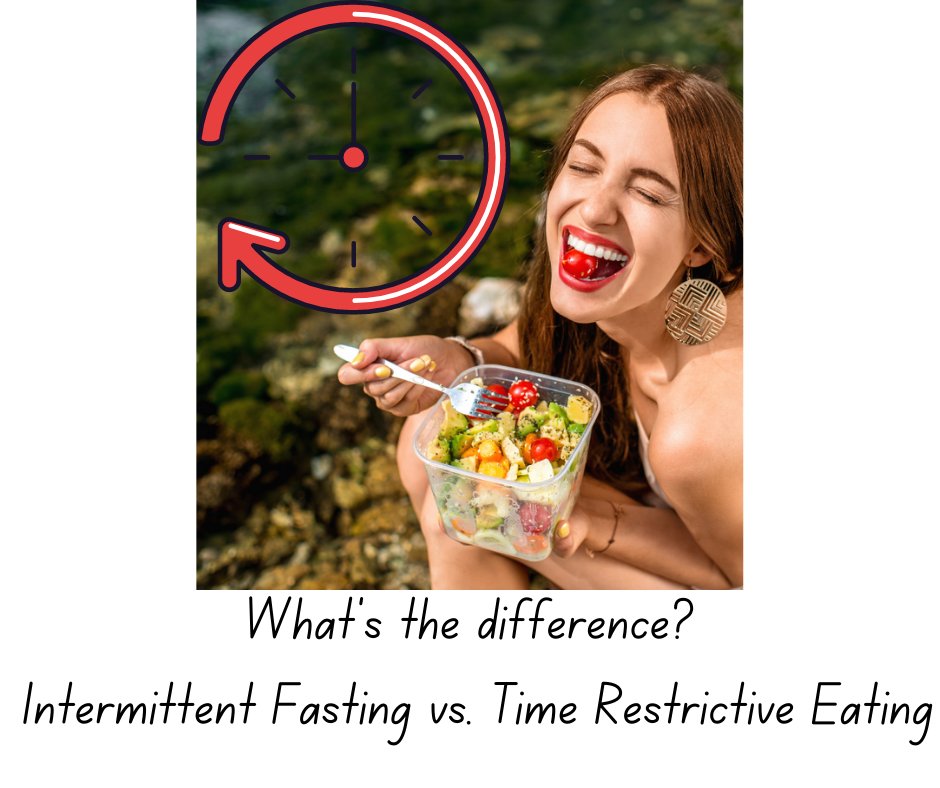
I hear all the time about Intermittent Fasting and the health benefits it can give you. I myself have used some of these techniques, not so much for weight loss but for other health benefits it is purported to provide. You know I am not a big fan of “diets” unless the diet has your name on it. We are all unique individuals with unique biology. But there is also another method of timed eating out there that is based on your circadian rhythm and your biology, this is called Time Restricted Eating.
Today I want to compare the two ways of timed eating, just for interest sake. What I like about timed eating, it is only a restriction of time, not calories or food. You can still enjoy the healthy food you like!
Intermittent Fasting
Intermittent fasting (IF) is all about when you eat. Meaning you only eat during a specific time. Mark Mattson, Ph.D., a Johns Hopkins neuroscientist, has studied intermittent fasting for 25 years. He says, we have evolved to go for periods without food. In prehistoric times, before humans learned to farm, they were hunters and gatherers who evolved to survive for long periods without eating. It took a lot of time and energy to hunt game and gather nuts and berries.
There are several different ways to do IF and are all based on choosing time periods to eat and to fast. For instance, you might try eating only during an eight-hour period each day and fast for the remainder 16 hours. Or you might choose to eat only one meal a day two days a week, known as the 5:2 approach. I am not a fan of this method, I don’t like so much restriction.
Dr. Mattson says, that after hours without food, the body exhausts its sugar stores and starts burning fat. He refers to this as metabolic switching. Longer periods without food, such as 24 hours or longer is not better for you and may be dangerous. Going too long without eating might actually encourage your body to start storing more fat in response to starvation. YIKES, we want to steer clear of that!
Research shows that IF periods do more than burn fat. Mattson explains, “When changes occur with this metabolic switch, it affects the body and brain.” One of Mattson’s studies published in the New England Journal of Medicine revealed a range of health benefits associated with IF. These include a longer life, a leaner body and a sharper mind. “Many things happen during intermittent fasting that can protect organs against chronic diseases like type 2 diabetes, heart disease, age-related neurodegenerative disorders, even inflammatory bowel disease and many cancers,” he says. But IF is not for everyone. Some people should steer clear of fasting. Keep in mind that IF may have different effects on different people.
Time Restricted Eating
Time restricted eating is the research conducted by Dr. Satchin Panda of the Salk Institute. He studied time restricting eating based on circadian biology. His studies showed that eating only during daylight hours, not only caused a reduction in weight, but also decreased fat, increased muscle mass and increased endurance in both animal and human research. The study highlights that it is WHEN you eat that is more important than WHAT you eat.
Why is it important to restrict eating to daylight hours?
According to Dr. Johnson, your liver metabolizes glucose during daylight hours and is strongest during the morning and weakens during the evening. Cells are much more sensitive to insulin during the day and less so at night. This is because melatonin will inhibit the release of insulin from your pancreas. Melatonin is not only a brain hormone, most is made in your gut from Serotonin. Gut melatonin goes directly to the pancreas and modulates the secretion of insulin. Melatonin is secreted in most people 3 hours before you go to bed. Genetically for most people, this would be a bedtime of 10 pm. That’s why its important to eat lighter meals in the evening and stop eating at least 3 hours before bedtime.
In the study, Time Restricting Eating did not affect how many calories participants burned but increased fat burning for several hours at night and improved metabolic flexibility, which is the ability to switch between burning carbs and burning fats.
Your circadian clock starts when you consume anything other than water. Even black coffee will activate the clock genes in your liver, this contrasts IF that allows black coffee during fasting…interesting.
Panda says, do not skip breakfast and make lunch your biggest meal of the day. You do not want to start your clock at noon (as is the case often with IF plans). This goes against your circadian biology when our body is shifting toward sleep as the sun goes down. Stop eating after 12 hours. For example, if your first cup of coffee or tea is at 6am then stop all eating and drinking at 6pm (except for water). So this leans to a more 12 hour/12 hour split of time and would lean to eating earlier in the day.
So looking at the two ways of timed eating….
Time Restricted Eating is NOT the same as Intermittent Fasting. IF does not account for circadian biology and simply follows a timed fasting periods, usually putting all your food intake later in the day as people who use IF tend to skip breakfast. Where as time restricted eating works with you biological clock and when metabolism is more active.
So it seems the two plans have some real differences and perhaps could be beneficial to our health based on research. BUT, do your OWN research.
This blog is just for entertainment and not medical advice. You should always talk to you physician before you modify or try any eating plan, especially any type of fasting.